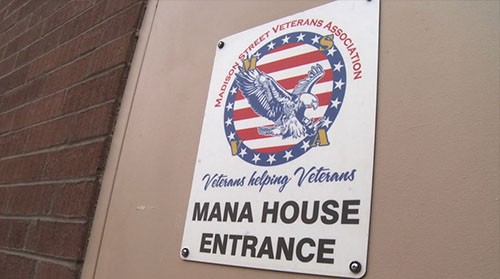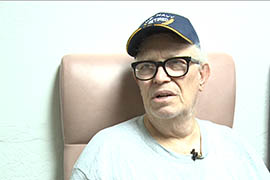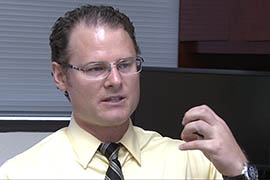Cronkite News has moved to a new home at cronkitenews.azpbs.org. Use this site to search archives from 2011 to May 2015. You can search the new site for current stories.
Valley agencies close to eliminating chronic homelessness of vets
PHOENIX – By Jan. 1, housing agencies will have found homes for the last 56 chronically homeless veterans in the Valley, making it the first metropolitan area in the country to accomplish this, advocates say.
After Mayor Greg Stanton told a Veterans Day event that Phoenix would commit $100,000 to the effort, the City Council voted Tuesday to do just that. The funds will pay for temporary housing for chronically homeless veterans and for additional case workers to bring them services.
Jodi Liggett, Stanton’s senior policy adviser on homelessness, said ending chronic homelessness among veterans will galvanize the public to help homeless families and address chronic homelessness among the general population.
“You start to realize, ‘Oh, this is possible,’” she said. “You don’t have to have people living under bridges and pushing shopping carts around in your community. It doesn’t have to be that way, it’s not inevitable.”
Two years ago, there were 222 veterans who met the definition of chronically homeless in the Phoenix area. In October, advocates counted 56.
This is the result of about five years of work by state and local agencies and nonprofit groups, using money from the federal government, said Sean Price, homeless veteran services coordinator at Arizona Department of Veterans’ Services.
“If you don’t have that high-level leadership and support, then it’s very hard to break down all the barriers in the systems that are in place to tackle the chronic,” he said.
Price said housing chronically homeless veterans will allow transitional and emergency shelters to serve veterans more effectively.
“If we can eliminate that chronic piece, that’s gonna free up a lot more resources for the general homeless veteran population,” he said. “And also the chronic population, the majority of them are living on the street, so that’s the visible sign of veteran homelessness, so you’re taking out the hardest to serve and then you’re working up to an easier-to-servale population.”
Price said that veterans made up almost a quarter of all people at shelters when service providers began focusing on eliminating chronic homelessness among veterans several years ago. Today, Phoenix is on track to provide housing for all veterans who need it by 2015, meeting the target set by the federal Department of Veterans Affairs.
That was welcome news to Mitch, who served in the Navy during the Vietnam War and found a home at a transitional shelter two weeks ago. He asked that his last name not be used so that future potential employers couldn’t identify him as someone who had been homeless.
Mitch choked up as he described 11 painful months on the streets, bouncing around among emergency shelters.
“The older we are, the more vulnerable we are,” he said. “I was beat up a couple of times, I was robbed about five or six times. I wound up in the hospital on and off all year long. It’s embarrassing and it’s very hard to deal with. It’s hard to describe how it makes you feel.”
In Phoenix, advocates said, it takes an average of 28 to 33 days to find permanent, independent housing for veterans who are chronically homeless. The money approved by the City Council will provide shelter during that period.
The federal government says people are chronically homeless if they spent at least 12 consecutive months on the streets or experienced four separate periods of homelessness in the last three years with a disabling condition such as a physical or mental health issue or a substance abuse problem.
Liggett said getting chronically homeless people into housing has a variety of benefits both for the homeless individuals and families and for society.
“Being homeless is like living under siege,” she said. “You are constantly on your guard, it’s actually a very dangerous way to live.”
Chronically homeless people often use emergency medical care, Liggett said. What would be non-catastrophic health issues among other populations can add up to $40,000-$80,000 in emergency care per person annually.
“The human cost is terrible, but there’s also a real hard-dollar cost to the community when people are chronically homeless,” she said.










